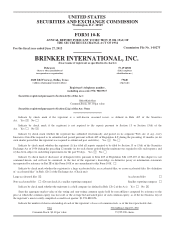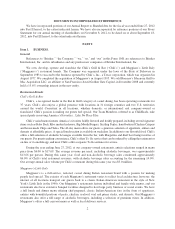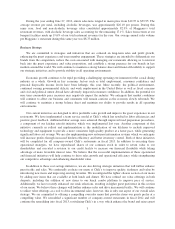Chili's 2012 Annual Report Download - page 19
Download and view the complete annual report
Please find page 19 of the 2012 Chili's annual report below. You can navigate through the pages in the report by either clicking on the pages listed below, or by using the keyword search tool below to find specific information within the annual report.such as climate change, greenhouse gases and water conservation. This increased focus may lead to new
initiatives directed at regulating an as yet unspecified array of environmental matters. These efforts could result
in increased taxation or in future restrictions on or increases in costs associated with food and other restaurant
supplies, transportation costs and utility costs, any of which could decrease our operating profits and/or
necessitate future investments in our restaurant facilities and equipment to achieve compliance. Further, more
stringent and varied requirements of local and state governmental bodies with respect to zoning, land use and
environmental factors could delay, prevent or make cost prohibitive the continuing operations of an existing
restaurant or the development of new restaurants in particular locations.
Due to our international franchising, we are also subject to governmental regulations throughout the world
that impact the way we do business with our international franchisees and joint venture partners. These include
antitrust and tax requirements, anti-boycott regulations, import/export/customs regulations and other
international trade regulations, the USA Patriot Act and The Foreign Corrupt Practices Act. Failure to comply
with any such legal requirements could subject us to monetary liabilities and other sanctions, which could
adversely impact our business and financial performance.
The impact of current laws and regulations, the effect of future changes in laws or regulations that impose
additional requirements and the consequences of litigation relating to current or future laws and regulations, or
our inability to respond effectively to significant regulatory or public policy issues, could increase our
compliance and other costs of doing business and therefore have an adverse effect on our results of operations.
Failure to comply with the laws and regulatory requirements of federal, state and local authorities could result in,
among other things, revocation of required licenses, administrative enforcement actions, fines and civil and
criminal liability. Compliance with these laws and regulations can be costly and can increase our exposure to
litigation or governmental investigations or proceedings.
Our profitability may be adversely affected by increases in energy costs.
Our success depends in part on our ability to absorb increases in utility costs, in particular electricity and
natural gas. Various regions of the United States in which we operate multiple restaurants have experienced in
the recent past significant increases in utility prices. These increases have affected costs and if they occur again,
it would have possible adverse effects on our profitability to the extent not otherwise recoverable through price
increases or alternative products, processes or cost reduction procedures. Further, higher prices for petroleum-
based fuels may be passed on to us by vendors putting further pressure on margins as well as impact our guests
discretionary funds and ability to patron our restaurants or guests’ menu choices.
Shortages or interruptions in the availability and delivery of food and other supplies may increase costs or
reduce revenues.
Possible shortages or interruptions in the supply of food items and other supplies to our restaurants caused
by inclement weather, natural disasters such as floods, drought and hurricanes, the inability of our vendors to
obtain credit in a tightened credit market, food safety warnings or advisories or the prospect of such
pronouncements, or other conditions beyond our control could adversely affect the availability, quality and cost
of items we buy and the operations of our restaurants. Our inability to effectively manage supply chain risk could
increase our costs and limit the availability of products critical to our restaurant operations.
Successful strategic transactions are important to our future growth and profitability.
We evaluate potential franchisees of new and existing restaurants and joint venture investments, as well as
mergers, acquisitions and divestitures, as part of our strategic planning initiative. These transactions involve
various inherent risks, including accurately assessing:
• the value, future growth potential, strengths, weaknesses, contingent and other liabilities and potential
profitability of franchise and joint venture partner candidates;
11
























